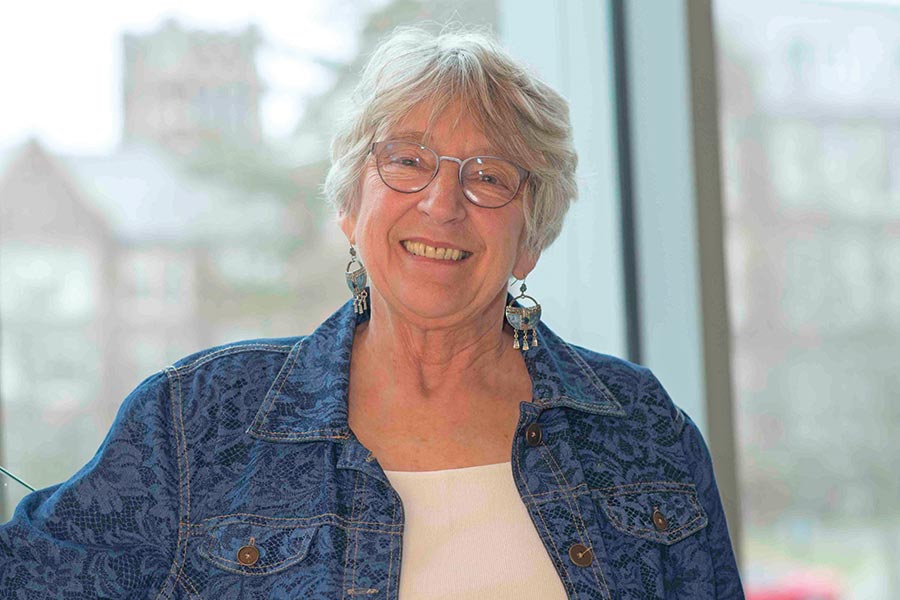THEIR LIFE'S WORK
A Cancer-Prevention Career
Norma Fox Kanarek ‘74 has spent 30+ years as a researcher and public health advocate
by Chris Farnum

Norma Fox Kanarek, Ph.D., realized a truth about herself and her life’s work during a “homework” walk outside.
Several years into her career as an epidemiologist and supervisor, she became very interested in the utility of Myers-Briggs personality types. “In Nazareth tradition, I took a Catholic retreat center’s class on Myers-Briggs and spirituality,” she says. One assignment was to overload her senses and wait for an intuitive flip.
“Don’t talk to anyone. Just soak up the sunshine. Listen. Pick up a crinkly leaf,” she remembers being instructed. She noticed what appeared to be a person standing in the woods nearby and moved closer to see why someone was in the rain-soaked woods. It turned out to be a statue.
She thought to herself: “Why did I think that was a real person?” Then, “That’s what I do — I make stones come alive.”
In public health — where she has worked for more than 30 years, mostly on cancer causes and prevention — Kanarek makes sense of, and communicates about, inanimate statistics. “In explaining it,” she says, “I can make it come alive for you.”
Sharing Her Wisdom With Students
She returned to Nazareth during Public Health Week to talk to students about her career. She studied psychology at Nazareth, unsure then what career she would pursue. Her first job exposed her to public health.
Working for the director of research at Highland Family Medicine, she was part of a project that screened children for elevated lead levels. Her boss suggested she pursue epidemiology, which eventually led her to University of North Carolina, Chapel Hill, for a master’s degree in statistics and then a Ph.D. in epidemiology.
“What attracted me was the problem-solving,” says Kanarek, now an associate professor of environmental health and engineering at Johns Hopkins University Bloomberg School of Public Health in Maryland.
She has brought that problem-solving interest to multiple roles in her career, including working for the state health department and for a non-profit policy group. She has studied cancer rates and racial health disparities, chaired her state’s cancer surveillance work, and been an advisor to the federal Centers for Disease Control and Prevention. One important statewide project in the 1990s was providing data to hospitals across Maryland to document the need for and build breast cancer screening centers to catch cancer earlier, when it’s more treatable. Kanarek is glad to see cancer mortality rates in the state have dropped from worst in the nation to 30th, but she is concerned that the incidence of prostate cancer and breast cancer is still comparatively high for Maryland.
Personal Changes Can Lower Cancer Risk
Kanarek wishes the public understood and took to heart that environmental factors are only about 15% to blame for cancer. “There’s so much we can do ourselves in lifestyle,” she says. Even women expected to be at higher risk for breast cancer and ovarian cancer because of inherited genetic mutations can lower their risk by not smoking, drinking little or no alcohol, maintaining a healthy body weight, and skipping hormone replacement therapy, for example. “Sometimes you do die from cancer, but survival is in your favor,” says Kanarek, who has been a breast cancer survivor for 10 years.
What Else Would She Like to Influence?
In public health, she sees work to do to prepare communities for disasters such as floods and even economic recessions. A community’s baseline level of functioning is a place to start. “One way of improving disaster response and recovery is to have initial community functioning be as high as possible,” she says.
Whatever she pursues, Kanarek is sure to find ways to make the data come alive.
Chris Farnum is an associate director in Marketing and Communications. Photo by Sean Healey '19.